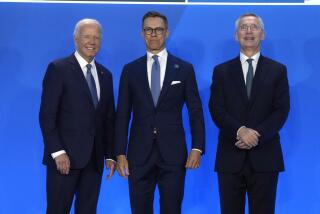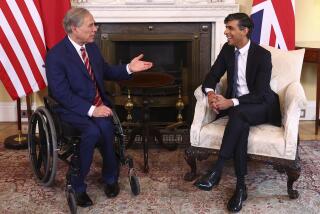British Agree to Join ‘Star Wars’ Research
BRUSSELS — The United States and Britain reached agreement in principle here Wednesday on technical arrangements for substantial British participation in the research phase of the American “Star Wars” space-based missile defense program.
Meanwhile, a final statement at the conclusion of a two-day meeting of defense ministers at North Atlantic Treaty Organization headquarters here proclaimed “the full support and solidarity of the alliance” behind President Reagan for his summit meeting three weeks from now with Soviet leader Mikhail S. Gorbachev.
The agreement on British participation in the “Star Wars” program, formally known as the Strategic Defense Initiative, was worked out on the sidelines of the NATO Nuclear Planning Group meeting in separate talks between Secretary of Defense Caspar W. Weinberger and British Defense Secretary Michael Heseltine. It is subject to final government approval in Washington and London, but in Heseltine’s words, “if we had come here to sign a deal we could have, but that’s not the way it works.”
The agreement will be the first bilateral arrangement for “Star Wars” participation to be negotiated by the United States. A similar accord is also under discussion with West Germany.
Usually a Private Decision
Most governments are so far leaving it up to their high-technology companies to decide whether to seek research contracts under the “Star Wars” program, but the British were particularly determined to clarify delicate but important matters of technology transfer--and their own rights to the results of any research arising from “Star Wars” contracts.
Heseltine said these issues have now been resolved but that the terms of the understanding will remain secret. He met with Weinberger for more than an hour Tuesday afternoon. Other British and American officials then held a long negotiating session during the evening, and the two defense ministers held a final session lasting about two hours at the conclusion of the NATO meeting Wednesday morning.
The British had to drop their earlier insistence that Washington commit itself to some general allocation of funds for research projects in Britain. When Heseltine visited Washington in July to initiate discussion on an agreement, he was putting a price tag of around $1.5 billion on the potential value of British research contracts.
But at the end of his talks with Weinberger, he acknowledged “there is no possible way that the United States government can commit itself on a program that is, in any case, going to extend across three American administrations, and no way that I can deliver any guarantees of our participation.”
British Specialization
Weinberger commented that “a substantial British participation in the program will be guaranteed by the excellence and expertise of British research in a number of areas not in our own programs.”
In fact, one American research contract has already been let with an Edinburgh University laboratory that specializes in optic fibers. The intergovernmental agreement is designed primarily to cover, or protect, industrial companies on such questions as patent rights and technology transfer.
The final statement from the Nuclear Planning Group discussions confirmed that all nuclear mines have been withdrawn from the NATO stockpile in Europe. The stockpile will be reduced from 6,000 to 4,600 warheads by 1988, and further reductions are in the planning stage--provided that other modernizations of NATO defense can be assured.
It also declared that the Western allies take “the most serious view” of Soviet violations of existing arms control treaties and agreements, and it expressed concern at the “steady buildup of Soviet nuclear forces.”
Weinberger, before returning to Washington, said he was “absolutely delighted--one of the greatest degrees of unity and support of any meetings I’ve attended. We are entering the negotiations in Geneva from a position of strength.”
More to Read
Sign up for Essential California
The most important California stories and recommendations in your inbox every morning.
You may occasionally receive promotional content from the Los Angeles Times.










